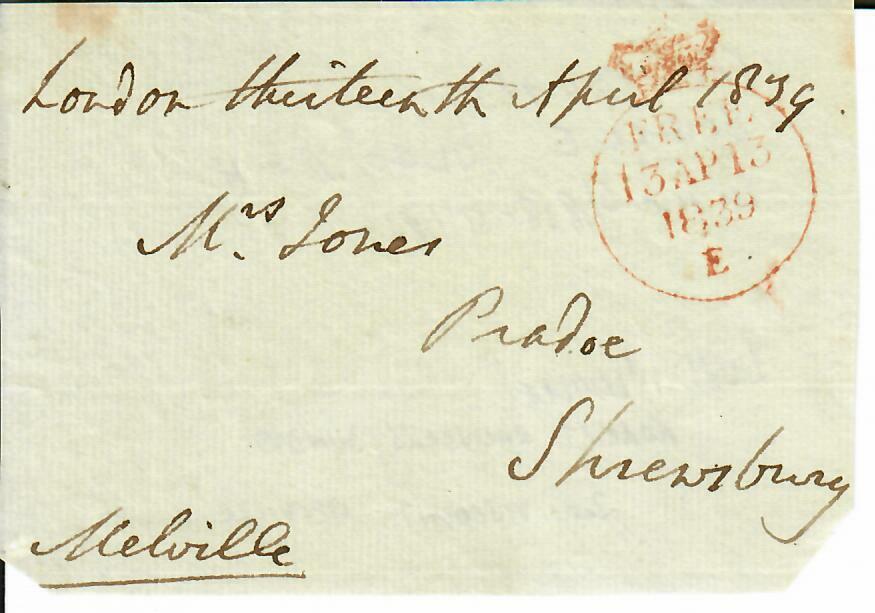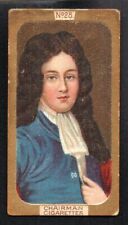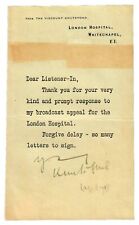When you click on links to various merchants on this site and make a purchase, this can result in this site earning a commission. Affiliate programs and affiliations include, but are not limited to, the eBay Partner Network.
Up for sale a RARE! "2nd Viscount Melville" Robert Dundas Hand Signed Free Frank Dated 1839.
March 1771 – 10 June 1851) was a British statesman, the son of Henry Dundas, the 1st Viscount. Dundas was the Member of
Parliament for Hastings in 1794, Rye in 1796 and Midlothian in
1801. He was also Keeper of the Signet for Scotland from
1800. He was appointed a Privy
Counsellor in 1807,[ a Fellow of the Royal Society in 1817,] a Knight of the Thistle in
1821,[ and was Chancellor
of the University of St Andrews from 1814. Melville filled
various political offices and was First Lord of the
Admiralty from 1812 to 1827, and from 1828 to 1830; his eldest
son inherited his title. He was born in Edinburgh on 14 March 1771, the only son of Henry
Dundas, 1st Viscount Melville, and his first wife, the former Elizabeth Rannie (1751–1843). Educated at the Royal High School,
Edinburgh, he went in 1786 with his tutor John Bruce on
a continental tour and enrolled at Göttingen University.[1] He studied afterwards at the University of Edinburgh and
at Emmanuel College,
Cambridge, and was admitted at Lincoln's Inn in 1788. After a successful attempt at law
he became his father's private secretary from 1794, though he was brought in as
MP for Hastings in
1794, and then Rye in
1796. The same year, on 29 August, he married an heiress, Anne Saunders (died
10 Sept 1841), and took her name beside his own. They had four sons and two
daughters; their eldest son, Henry Dundas,
later third Viscount Melville, became an army officer while their second
son, Richard Saunders Dundas,
became First Naval Lord. Dundas
was appointed Keeper of the Signet for Scotland and
elected MP for Midlothian (Edinburghshire) in 1801. He remained silent
in parliament until his speeches of 1805 and 1806 in defence of his father, who
was then being impeached. His first real test came in negotiating to be left in
charge of Scotland by a hostile 'ministry of all the talents'. He got nowhere,
but won the respect of his own side, and the problem vanished with the
ministry's collapse. He was rewarded with the presidency of the Board of Control for India by
the Duke of Portland in
1807. Dundas's main task was to frustrate any possibility that Napoleon might exploit his alliance with Russia to make some attempt on British India. He sent a
mission to the shah of Persia, at whose court French agents were
present. He formed alliances with the princes of Lahore and Kabul.
He ordered occupation of the Portuguese factories in India and China,
of the Dutch colony of Java, and of the French stations on Mauritius and Réunion. He had also to deal with a sharp deterioration,
through loss of trade during the war, in the finances of the East India Company. A
series of reports on its development since the India Act of 1784, written by a
select committee which he chaired, concluded that it should give up its
inefficient trading privileges, at least in the subcontinent. Dundas drafted
the legislation which ended them at the renewal of the company's charter in
1813. Dundas's Indian administration was interrupted for six months in 1809
when he served as Chief Secretary for
Ireland. Spencer Perceval, succeeding Portland, then wanted to promote
him to the cabinet as secretary for war, but this did not happen due to the
wishes of his father. Dundas returned to the Board of Control, still without a
place in cabinet. He succeeded as Viscount Melville on 27 May 1811. The next year, under
Prime Minister Lord
Liverpool, he was promoted First Lord of the
Admiralty. While the Napoleonic wars went on, his job was to
maintain the British maritime supremacy established at the battle of Trafalgar. In a
state paper of February 1813 he pointed out that France, with the shipbuilding resources of disposal, would be able to construct a fleet to match Britain's if the
struggle continued much longer. The point was underlined by complaints from
the Duke of
Wellington in Spain of inadequate protection for
the convoys supplying him, especially after the outbreak of hostilities with
the United States in 1812 unleashed hordes of American
privateers on the Atlantic. Drastic cuts followed the eventual peace, but
Britain, now the only colonial power of any importance, found her maritime
commitments increased. Melville did not think the fleet could be reduced much
below 100 ships of the line. The cabinet set a limit of forty-four. The
following years saw a constant struggle by Melville to find every possible
economy while he avoided meeting a target he regarded as unreal. He quietly got
his way, not least by improving the design and durability of ships, research on
which benefited from his close personal interest. Yet he resisted the
introduction of steamers, since an infant technology seemed bound to prove
expensive and unreliable; moreover, if navies were to be rebuilt all round as
steam driven, Britain would place herself on the same level as her rivals. By
the late 1820s he was able to authorise the construction of new and larger
classes of ship, matching those in France and the United States. Even out of
tight budgets he never failed to squeeze something for another scientific
interest, in exploration (where places are named after him, see below). Appointed
a governor of the Bank of Scotland, he was
elected chancellor of the University of St Andrews in
1814, and made a Knight of the Thistle in
1821. The crisis of the system came in 1827 on the resignation of Liverpool and
the succession of George Canning, who was
set on Catholic emancipation.
Melville said that, while he personally supported it, he could not approve of a
policy which would split the outgoing cabinet. The Whigs in Canning's
coalition now persuaded him that a Scottish manager was unnecessary; the home
secretary could do all the work with a native adviser or two.









